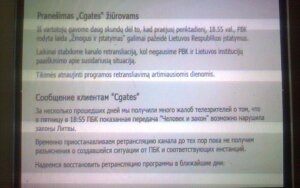- October 8, 2013
- 536
A reader: “Why can we use bilingual subtitles on TV? Doesn’t it break the law?”

The reader of PL DELFI, whom called himself a “Pole”, sent on the editing address a picture, in which an information about one of Lithuanian TV channels is visible.
The reader asks : “Why can we use bilingual subtitles on TV? Doesn’t it break the law?”
As the response, redaction of PL DELFI investigated “Republic of Lithuanian Law on the provision of information society”. Article 34. of this act tells us about a language of publishing any public information.
Article 34. The language in which the public information is prepared and published
- 1. The public information is prepared and published in a native language or another languages, on the basis of the given Law and the Law about the native language or decrees established by Commission of the Lithuanian Language(…)
- 2. Radio or(and) television shows being broadcast in non-Lithuanian language, should be translated into native tongue or transmitted with Lithuanian subtitles. Technical, educational or musical(…) shows, the programs of offshore Radio or TV stations, whether shows created in Lithuania and destined to ethnic minorities here(…) are the only exceptions.
- 3. Transmitting audiovisual shows, translated from the official language of the European Union to the non- official EU language is prohibited.
Vis-a-vis Article 34. of “ Republic of Lithuanian Law on the provision of information society” , announcement of wired television can be acknowledged as a program addressed to Russian minority. This information is given also in the native language, what doesn’t break the aforementioned law.
You can familiarise with details of “ Republic of Lithuanian Law on the provision of information society” here.
Tłumaczenie by Paulina Sulowska w ramach praktyk w Europejskiej Fundacji Praw Człowieka, www.efhr.eu. Translated by Paulina Sulowska within the framework of a traineeship programme of the European Foundation of Human Rights, www.efhr.eu.

